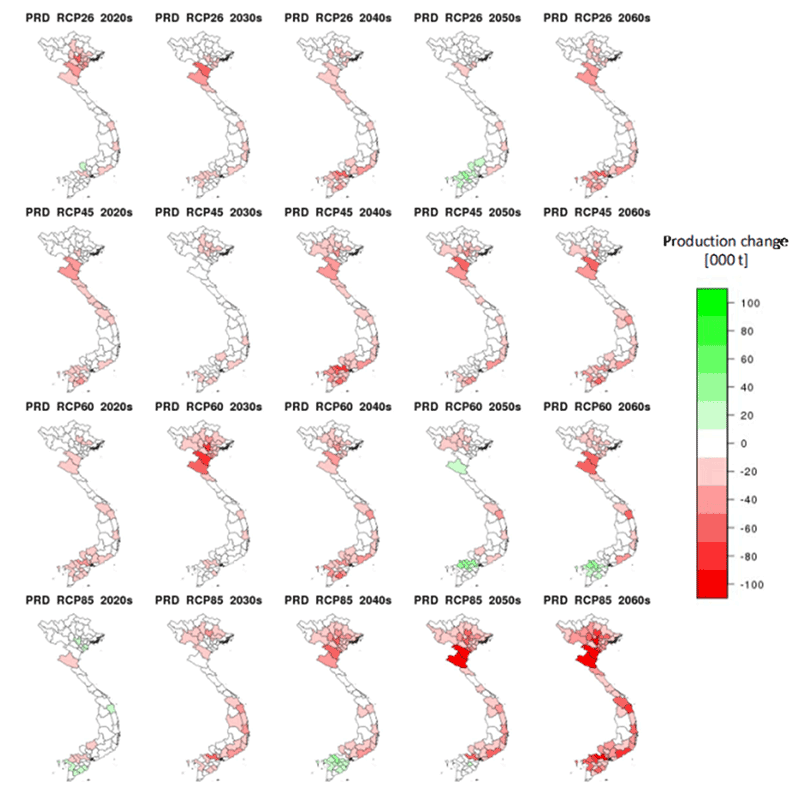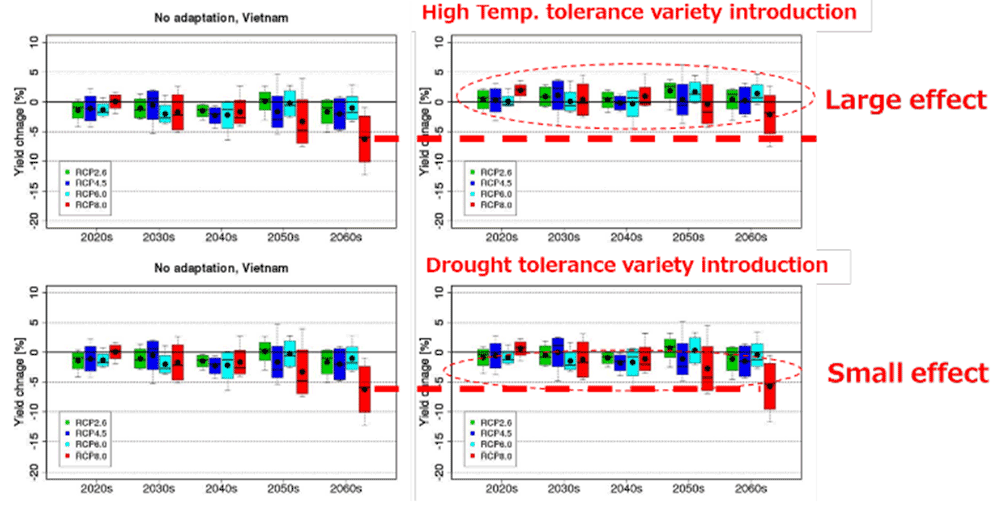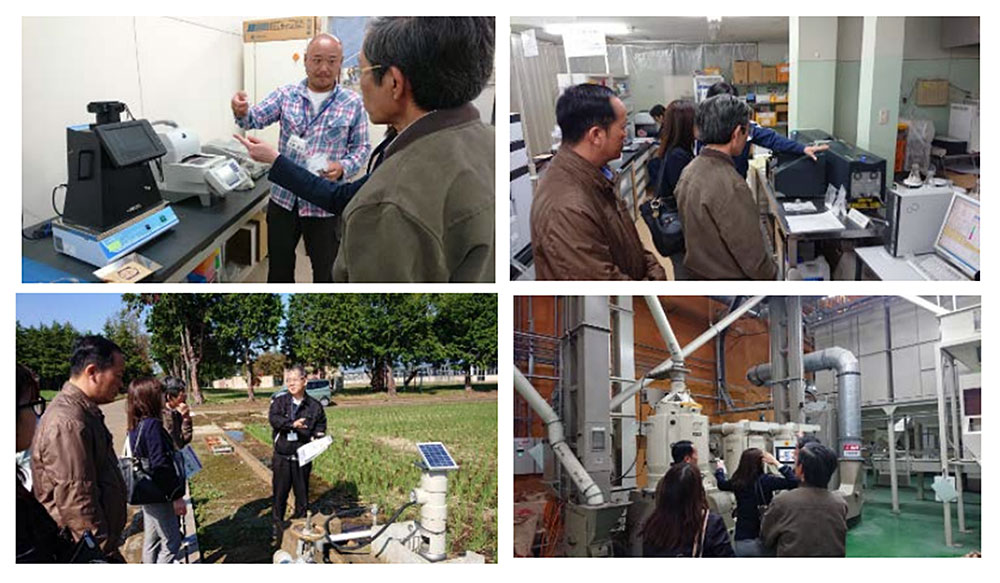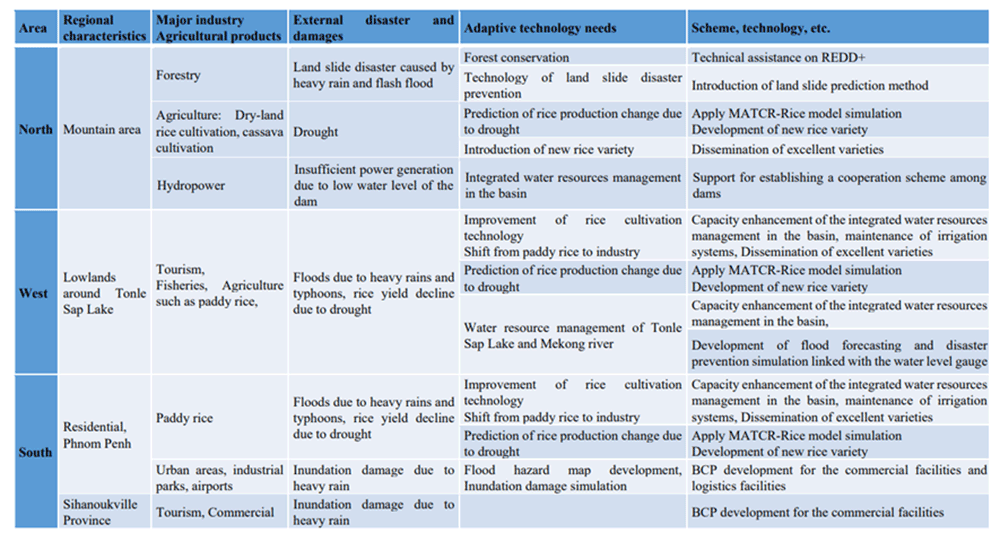 Vietnam
Vietnam
- Assisting the Ministry of Natural Resources and Environment (MONRE) in facilitation of NAP development
- Impact assessment of CC regarding rice production and possible adaptation options in the Hue province
- Support of mainstreaming adaptation in the agricultural sector (rice) in the Hue province
- Dissemination of the project outcomes to other countries (Cambodia, Laos)
Assisting the Ministry of Natural Resources and Environment (MONRE) in facilitation of NAP development
Assisted MONRE in facilitation of NAP development by sharing the experiences of Japan as bellow:
Organisational structure at the preparation stage
Overall formulation and facilitation of the process at the government level
How to organise and analyse information on vulnerability and impact assessments
Activities and shared information
Holding consultation meetings
Organising three separate consultation meetings and sharing the experiences and knowledge of Japan regarding important topics, in order to formulate the National Adaptation Plan; this includes aspects such as the formulation process, impact assessment methodology, and responses to public consultation.
Sharing the results of academic research on the impact of climate change in Vietnam and utilising meta-analysis techniques
Evaluation
What was accomplished?
Increased awareness of MONRE administrators on points to be considered in the NAP formulation process
Recommendation of information and material that should be included in the NAP
Capacity development contributions from MONRE regarding NAP and CCA
Agreement on continuous developmental cooperation in the M&E framework of NAP implementation
What are the issues?
Sharing of information from MONRE, which is necessary for consideration with the appropriate timing
Requirement for continuous on-site cooperation activities over a certain period

Impact assessment of CC regarding rice production and possible adaptation options in the Hue province
Conducted an impact assessment of climate change on rice production in Vietnam using a crop model (MATCRO-Rice)
Improve MATCRO-Rice and assessment methods, to account for drought and flood effects
Conduct impact assessment of CC on rice production in the future
Propose adaptive options
Simulation setting
- Simulation period: 2010–2069
- Base years: 2010s;
- Assessment years: 2020s, 2030s, 2040s, 2050s, 2060s
- Four RCPs: RCP2.6, RCP4.5, RCP6.0, RcP8.5
- Four GCMs:HadGEM2-ES, IPSL-CM5A-LR, MIROC5, GFDL-ESM2M
- Three adaptation options:
- High temperature tolerance (HT) variety
- Drought tolerance (DT) variety
- Full irrigation (IRR)


Overall, climate change will reduce rice yield in Vietnam.
The RCP8.5 scenario will have the largest yield loss after the 2040s, while the other scenarios will exhibit small negative impacts.
Mitigation will be effective.
Remaining impacts should be reduced via adaptation.
Proposed adaptation options

Support of mainstreaming adaptation in the agricultural sector (rice) in the Hue province
Consultation meetings were held with the relevant agencies to provide scientific evidence of the future impact of climate change on rice productions and proposal of possible adaptation measures. Two senior officials (DONRE, DARD) visited Japan to obtain knowledge and practical experience regarding adaptation measures applied in Japan. A handbook to introduce the outputs of the project was drafted through cooperation with senior officials.
Training in Japan
Learned the process of mainstreaming adaptation in the Saitama prefecture
Learned the adaptation measures in the agricultural sector at the National Agriculture and Food Research Organization
Learned about the post-harvest processing technology used for maintaining the value of high-quality rice by private companies
A handbook was drafted, in order to introduce the project outputs


DRAFT handbook report on the progress of the mainstreaming climate change adaptation into the socioeconomic development plan in local government (Case of Thua Thien Hue Province):
English version, Vietnamese version
Findings
In order to apply the adaptation measures formulated by DONRE, DARD, and other organisations into comprehensive development plans (such as the Socio-Economic Development Plan), it is essential to propose concrete adaptation measures based on the most up-to-date climate-change projections and impact assessments.
While it is possible to utilise existing systems for monitoring, it is ultimately more important to monitor and evaluate the progress of adaptation in a comprehensive manner across sectors. For this purpose, it is necessary to establish a new system and a forum for discussions with the committee. In addition, DPI and DONRE are required to cooperate with each other. In regards to application of climate-change adaptation in comprehensive development plans (such as the socio-economic development plan), the leadership and coordinating roles of DONRE, which is the final responsible office for implementing adaptation measures, are critical. Increasing the number of personnel may be necessary if the given number is insufficient.
If adaptation measures can be applied and positioned in development plans, the budget for adaptation measures will be secured. Reliable, up-to-date data and research support are essential for this.
In implementing development plans and monitoring adaptation measures positioned therein, it is important that DPI and DARD, the bureaus responsible for development plans, cooperate well to promote effective monitoring.
Extensive consultation with stakeholders should be conducted concurrently with the draft of the Socio-Economic Development Plan. In these consultations, the positioning of climate change adaptation measures in the above development plan must be clearly explained, stakeholder understanding must be promoted, and opinions should be sought simultaneously.
Dissemination of the project outcomes to other countries (Cambodia, Laos)
Disseminated the project outcomes to Cambodia and Lao to identify opportunities to expand the efforts in support of climate change adaptation planning.
- Summarise the existing studies on climate change impact, risks, and vulnerabilities assessment in both countries,
- Meet with relevant organisations in both countries to discuss the possibilities of future cooperation on CCA,

Site survey and meetings with relevant organisations in November 2019
Cambodia: Ministry of Agriculture Forestry and Fisheries, Ministry of Environment, JICA, JETRO, and UNDP
Republic of Laos: Ministry of Agriculture and Forestry, Ministry of Natural Resources and Environment, National Agriculture and Forest Research Institute, JICA, JETRO and UNDP

Evaluation
What was accomplished:
- Obtained an understanding and positive response regarding the outputs and benefits of the MOEJ project from stakeholders of both countries
- Obtained positive responses from stakeholders regarding future cooperation projects
What is planned for the future:
- Development of mutual understanding regarding objectives, expected outputs, and frameworks of the cooperation project
- Selection of an appropriate site for a demonstration of MATCRO-Rice, after which an impact assessment will be conducted
- Survey of NAP development and implementation in both countries
- Proposal of future cooperative schemes, including adaptation of project formulation using climate funds such as the GCF

